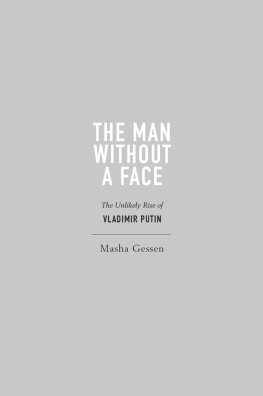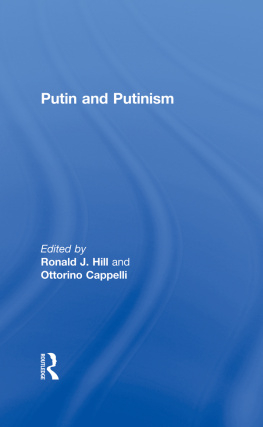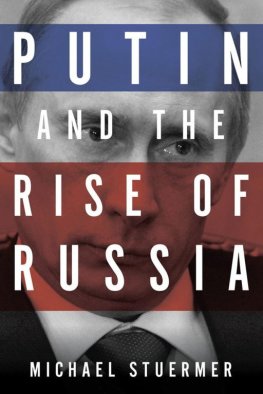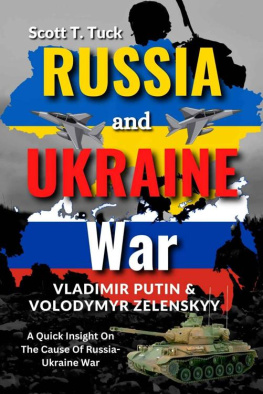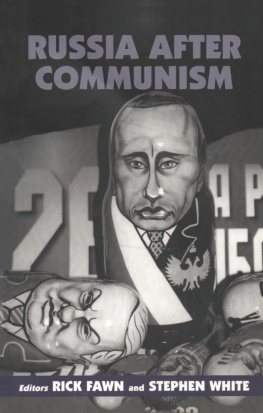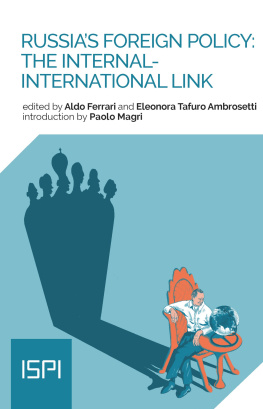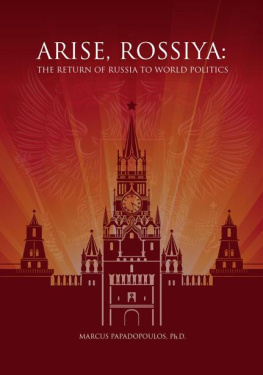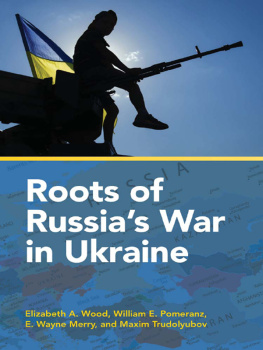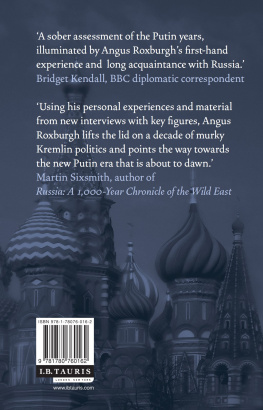Misinterpreting Modern Russia
Misinterpreting
Modern Russia
Bruno S. Sergi

2009
The Continuum International Publishing Group Inc
80 Maiden Lane, New York, NY 10038
The Continuum International Publishing Group Ltd
The Tower Building, 11 York Road, London SE1 7NX
www.continuumbooks.com
Copyright 2009 by bruno Sergi
All rights reserved. No part of this book may be reproduced, stored in a retrieval system, or transmitted, in any form or by any means, electronic, mechanical, photocopying, recording, or otherwise, without the written permission of the publishers.
Library of Congress Cataloging-in-Publication Data
Sergi, Bruno S.
Misinterpreting Modern Russia: western views of Putin and his presidency / Bruno S. Sergi.
p. cm.
Includes bibliographical references and index.
eISBN-13: 978-1-4411-0332-1 1. Russia (Federation)Politics and government1991-2. Russia (Federation)Social conditions1991-3. Russia (Federation)Economic conditions1991-4. Putin, Vladimir Vladimirovich, 1952-I. Title.
DK510.763.S443 2009
947.086dc22
2007039141
Printed in the United States of America
To the memory of journalists
Paul Klebnikov, Forbes
Anna Politkovskaya, Novaya Gazeta
Table of Contents
Chapter One
From the Reign of Lies to Modern RussiaAn Astonishing Story
Chapter Two
Modern RussiaThree Reforming Visions
Chapter Three
The Distorted Logic of the 1990s in Russia
Chapter Four
Consciousnesses of Russias Realities
Chapter Five
Experts Censured Modern Russias Western driven Economic Reforms
Chapter Six
Russias Manhattan BoysSome of Them Fell into Disgrace
Chapter Seven
Russia into the 2000sOil and Gas Bonanza
Chapter Eight
A Divided Society
Chapter Nine
Russias Democracy and Russians Attitudes
Chapter Ten
Clamping Down on CorruptionIs It Legitimate or Not?
Chapter Eleven
Toward Russias Next Kremlin
Chapter Twelve
Russia and the International Community
Acknowledgments
I drafted this books content page when I was an adjunct professor of Political and Economic Development in Comparative Perspectives at New York University in the summer of 2005. I continued through the final typescript in the summer of 2007, yet again at New York University, while I was teaching a class on the same subject.
Because these two periods of teaching affected this book, I owe particular appreciation to New York Universitys students who attended my courses. Equally, I express thankfulness to my students in Italy and across East-Central European universities where I gave a variety of academic courses, guest lectures, and seminars on transition economics and international business through the past several years. Truthfully, I have been more than fortunate to lecture very gifted students. Intense class interaction coupled with abiding public debate have been essential sources of research inspiration and enriched my intellectual curiosity about multifaceted new market economies enough to concentrate more on certain themes than on others and not to overlook ethical questions. The latter became noticeable during the finale of a moribund communist system, transformed in several ways ever since former President Mikhail Gorbachev brought perestroika and glasnost to Russia by the mid 1980s, and skyrocketed after Gorbachev abandoned the political scene at the end of 1991. Thus all through the research phase of this book, I took students suggestions seriously for their rousing contributions to my research work; they have been so important that they need warmhearted acknowledgment here.
Likewise, throughout my journey into Russian affairs, I profited from an immense channel of communication with those who really want to better comprehend the nature of Russias evolution. Similarly, a truly supportive environment came through a continuous dialogue and exchange of ideas with colleagues. Although I am not mentioning these colleagues explicitly, my intellectual debt goes to those whoby means of pedagogic and unfailingly constructive criticismfed my conception of the realities that have come into sight in Russia, coaching and contributing to the shaping of my research philosophies. They encouraged me in many ways to follow a realistic approach, and to be sufficiently attentive to ethical matters without seeking to be a scholarly know-it-all. They added dimensions to this books chapters in countless ways. Friends and colleagues Vadim Anufrijenko, Bill Bagatelas, Youssef Cohen, Marshall Goldman, Pavel Machitski, Peter Oppenheimer, and Vladimir Tikhomirov all read and commented on several portions of the manuscript. They made suggestions that contributed to closing several gaps in earlier versions of the manuscript, helped eliminate critical flaws from my earlier drafts, and offered precious advicequite extensively at timesabout reformulating certain thoughts. Although these people might still disagree with some conceptual frameworks of this book, they put me right on analyzing absorbing aspects of Russias complex circumstances. I deeply appreciate them.
What is more, I would like to pay a special tribute to Dr. David Barker, Continuum Publishings editorial director in New York. Every author would like to work with this kind of editor. David offered me trustworthy support and willingness to publish the book, especially his ability to appreciate the value of this challenging work, from the preliminary stages of my book proposal to accepting the title for the worldwide prestigious reading list at Continuum Publishing. I also wish to thank the staff of Continuum Publishing for their cooperation and their excellent job on the original manuscript, pointing me to several sections that needed clarification and to the logic and arguments made in several chapters.
Summing up, I am obliged to my colleagues and students for unflinching help, to the many people who carefully read portions of the text to increase its readability, and to my managing editor at Continuum for strong promotion of this worthwhile project.
Bruno S. Sergi
New York
August 4, 2007
Prologue
Misinterpreting Modern Russia begins in New York in the summer of 2005 and ends in the summer of 2007. These two dates separated a seemingly interminable time, even as I kept my writing in a holding pattern over a span of two years flanked by my teaching in the summer term of 2005 and of 2007 at New York University. Given the substantial complexity of the subject, an enigmatic wakefulness has accompanied my writing experience regarding the grounds that make possible in the West an absolute misreading of the modern Kremlins triumphs and failures. What is more, additional complexity emerges from the very nature of this work, which calls attention to numerous economic and political aspects to examine, obstacles to highlight, probable criticisms to counter. After having updated, expanded, perfected, and finished up the revisions of old drafts of the manuscript, I took the completed work to the publishing table.
Nevertheless, walking through and breathing in the absorbing atmosphere in the heart of New York Universitys Greenwich Village in Manhattan has been important. It has fueled my intellectual curiosity to reach more persuasive and knowledgeable conclusions about the multifaceted subject of Russia. Discussing the subjects of transition economics and politics with students in the United States and from all across Europe, who have solicited memore often than notto explain the weight of business ethics and political and economic developments in new market economies has affected this book a great deal. I simply took off the typical blindfold of western intellectuals!
Next page

